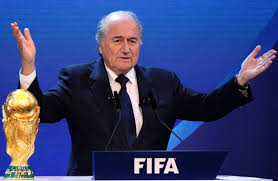By Andrew Warshaw
July 6 – Sepp Blatter has long maintained that politics played a part in the awarding of the 2022 World Cup to Qatar. But now he has named names in terms of the supposed guilty governments: France and Germany.
Blatter, who is stepping down as FIFA president, is determined not to go quietly and has been conducting a series of interviews in recent weeks as he defends both his reputation and his conduct amid the corruption allegations swirling round FIFA and the two separate probes being carried out by the US and Swiss authorities.
In his latest interview, Blatter said the French and German presidents at the time of the December 2010, ballot – Nicolas Sarkozy and Christian Wulff – lobbied on behalf of Qatar to try and influence proceedings.
“There were two political interventions”, Blatter told Germany’s Welt am Sonntag newspaper. “Sarkozy and Wulff tried to influence their voting representatives. That is the reason why we now have a World Cup in Qatar.”
According to Blatter, widely believed to have voted against Qatar, Wulff wanted the Gulf state to win “out of economic interests.”
“Look at the German companies!” Blatter said. “Deutsche Bahn, Hochtief and many more had projects in Qatar even before the World Cup was awarded. Those who have voted for Qatar should also take responsibility.”
Franz Beckenbauer, who was Germany’s FIFA executive committee member at the time, has never revealed how he voted. UEFA president Michel Platini, believed to be weighing up whether or not to go for Blatter’s job now that the veteran Swiss will shortly be out of the picture, has publicly stated he voted for Qatar but that “neither Sarkozy nor anyone” asked him to do so.
However, Platini has admitted that he and Sarkozy once attended a lunch with Qatari representatives in France. “It’s true that, when I was invited for a lunch in private with the president and I found myself with Qataris, I understood that there was a subliminal message,” Platini told L’Equipe some time ago.
Days after being re-elected for a fifth term in May, Blatter announced his decision to stand down amid a wave of arrests of senior FIFA figures accused by the US of bribery, fraud and money laundering worth more than $150 million. Swiss prosecutors, meanwhile, are specifically investigating whether the awarding of the 2018 and 2022 World Cups to Russia and Qatar was clean.
Blatter himself has not been accused of any crime but has decided to limit his travel plans. Explaining for the first time why he decided against going to the women’s World Cup final in Canada, he said: “I won’t take any travel risks until everything has been cleared up.”
Nevertheless, until he is replaced at an Extraordinary FIFA Congress, now expected to take place at the start of 2016, he looks likely to carry on speaking out. “I am here to fight. Not for myself, but for FIFA.”
He remains defiant that he personally has nothing to fear from the two ongoing probes into FIFA’s conduct.
“Is FIFA responsible from the top down for everything in football, what happens in some village somewhere around the world? Everyone has fears, for example of death, but with regard to my work at FIFA I have no fear. I’ve nothing to be afraid of. I am afraid that they want to wreck FIFA, a work that I helped create.”
Contact the writer of this story at moc.l1752122682labto1752122682ofdlr1752122682owedi1752122682sni@w1752122682ahsra1752122682w.wer1752122682dna1752122682

